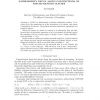Free Online Productivity Tools
i2Speak
i2Symbol
i2OCR
iTex2Img
iWeb2Print
iWeb2Shot
i2Type
iPdf2Split
iPdf2Merge
i2Bopomofo
i2Arabic
i2Style
i2Image
i2PDF
iLatex2Rtf
Sci2ools
IGPL
2006
2006
Satisfiability Decay along Conjunctions of Pseudo-Random Clauses
Abstract. k-SAT is a fundamental constraint satisfaction problem. It involves S(m), the satisfaction set of the conjunction of m clauses, each clause a disjunction of k literals. The problem has many theoretical, algorithmic and practical aspects. When the clauses are chosen at random it is anticipated (but not fully proven) that, as the density parameter m/n (n the number of variables) grows, the transition of S(m) to being empty, is abrupt: It has a "sharp threshold", with probability 1 - o(1). In this article we replace the random ensemble analysis by a pseudo-random one: Derive the decay rule for individual sequences of clauses, subject to combinatorial conditions, which in turn hold with probability 1 - o(1). This is carried out under the big relaxation that k is not constant but k = log n, or even r log log n. Then the decay of S is slow, "near-perfect" (like a radioactive decay), which entails sharp thresholds for the transition-time of S below any given lev...
| Added | 12 Dec 2010 |
| Updated | 12 Dec 2010 |
| Type | Journal |
| Year | 2006 |
| Where | IGPL |
| Authors | Eli Shamir |
Comments (0)

